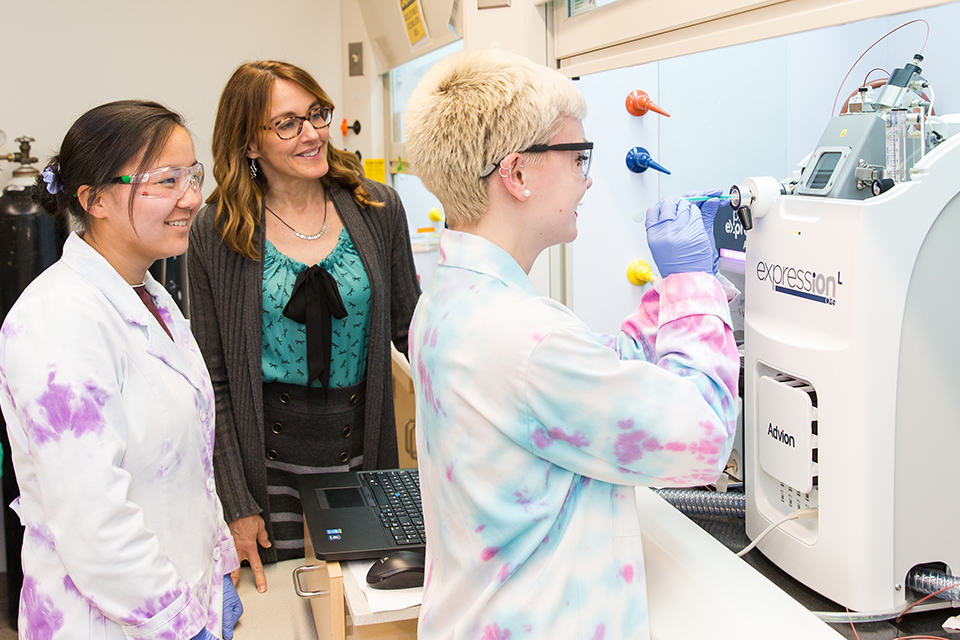Chemistry professor receives NIH grant to research new UTI treatments alongside undergrads

Urinary tract infections (UTIs) are one of the most common infectious diseases in the U.S., affecting about 15 million women a year. They’re challenging to treat, in part because 27% of women will experience a UTI recurrence within 12 months, even after successful antibiotic treatment.
“When you get a UTI, it’s usually treated with antibiotics and it clears up quite quickly,” said Dr. Susan Meschwitz, professor and chair of the Department of Chemistry. “However, months later it may come back. Simple infections are developing resistance to antibiotics and this has become a growing concern.”
Developing alternative treatments for UTIs has been Meschwitz’s focus for several years. She was recently awarded a $387,466 grant from the National Institute of General Medical Sciences of the National Institutes of Health (NIH) to research new treatments for the infection, and specifically, to do so alongside undergraduate students. The three-year project is part of a collaborative study that will be conducted with the University of Rhode Island’s Dr. Jodi Camberg and Dr. David Rowley.
A novel approach to a key women’s health issue
“The goal of this grant is to be able to understand recurrent UTIs,” Meschwitz said. “What we know is that most UTIs are caused by uropathogenic E. coli and the recurrent infection is caused by the same strain that caused the original infection. The bacteria have not evolved to be resistant, but rather enter a quiescent state within the cells of the bladder wall, essentially turning themselves off when the antibiotics were present, and waking themselves back up months later. We want to understand how the bacterium enter and exit this state. That will allow us to develop ways to treat this infection, not just with antibiotics, but with a molecule that prevents or reverses the quiescent state. At a basic level, we’re taking a different approach than an antibiotic does. We’re not trying to kill the bacteria, we’re trying to prevent them from talking to each other.”
Rigorous hands-on training for undergraduate students
The NIH Academic Research Enhancement Award that Meschwitz received funds small-scale, new or ongoing health-related research projects that give undergraduate students an opportunity to gain significant biomedical research experience. As such, a key focus for the project will be to train several undergraduate students each year to conduct experiments and analyze data. In Meschwitz’s laboratory, they will participate in all aspects of the project including peptide synthesis and characterization, screening and sequencing mutants, and identifying protein targets.
“When working with student researchers, I like to start with teaching basic laboratory techniques,” Meschwitz said. “The students will learn how to use instrumentation and read the scientific literature. They shadow current students in the lab. We will meet weekly to brainstorm and ask questions: What happened? What does it mean? What should we do next? It’s critical thinking in action.”
The students will also have the opportunity to work alongside graduate students and faculty at URI, where they can get a feel for what graduate school is like. The project will extend across the academic years and summers, and students will have the opportunity to travel to conferences and present their results.
“On this project students will work on new ideas; on things that haven’t been done before. They’re going to be the ones to help find the answers, or the non-answer,” Meschwitz said. “With NIH support, they’re going to receive hands-on lab experience where they will develop their critical thinking and problem-solving skills. This experience will help prepare them for their future, whether they enter the biomedical workforce or continue on to graduate school.”

